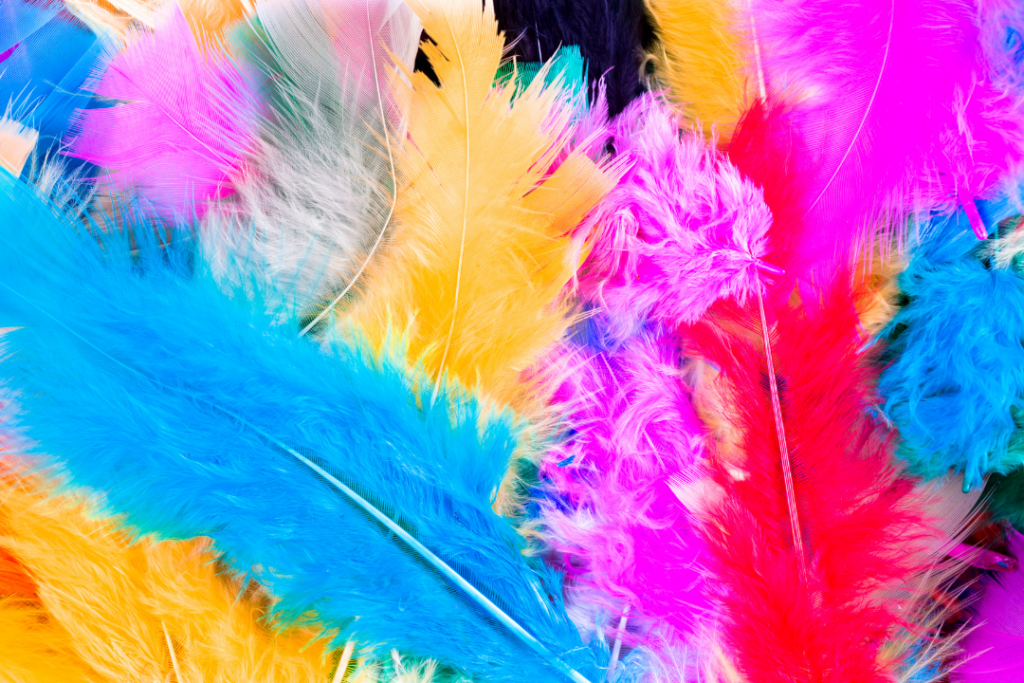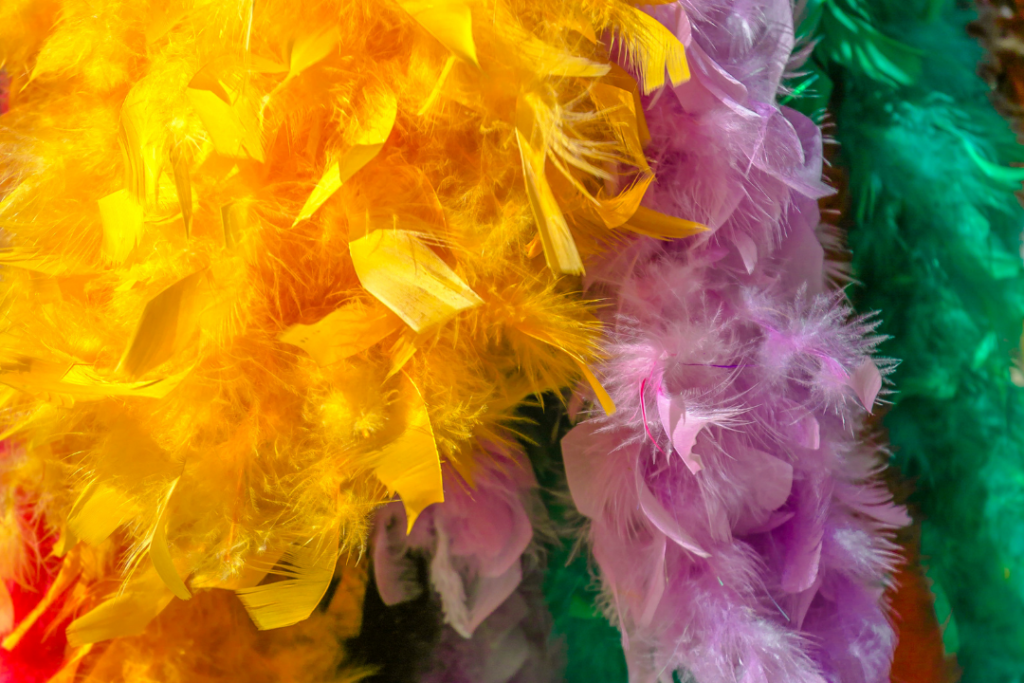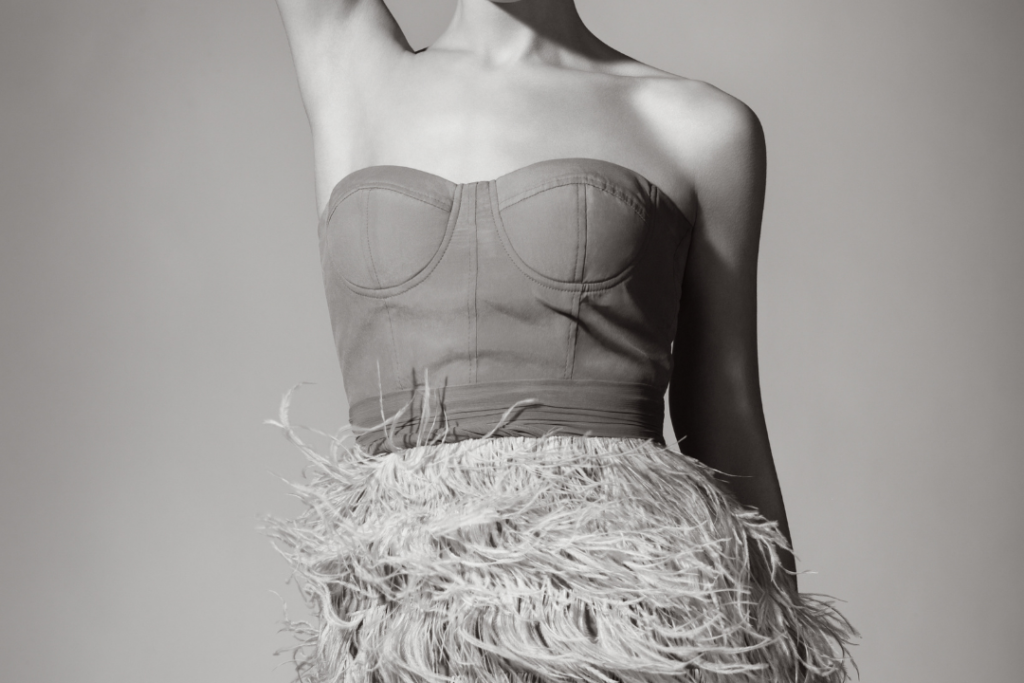
Feathers are everywhere in the fashion world lately. From the ubiquitous feather hair extensions, to jewelry, to prints and textiles evoking these stylish fowl, feathers are no longer just for costumes or haute couture. Feathers have gone mainstream, and with their rise to fame, my curiosity has reached new heights.
Were feathers always fashionable? What are the roots of feathers as clothing decorations? To find out, read on for info on the history of feathers in fashion.
Table of Contents
History of Feathers in Fashion

- While completing research for this post, I was surprised to find an article on fashionable feathers among, get this, Neanderthals. While investigating a cave near Verona, Italy, paleoanthropologist Marco Peresani and colleagues found 660 bird bones. “Cut, peeling and scrape marks are observed exclusively on wings, indicating the intentional removal of large feathers,” he stated. Peresani believes the bird feathers were used for ornamentation and not another, more practical purpose. Of the 22 bird species found de-feathered, most were not known to be good food sources, and during investigation, it was evident that only certain feathers were plucked. “[They] removed the remiges, which are the longest and more beautiful feathers,” Peresani said. Makes you wonder what else Neanderthals were rocking…
- Native American headdresses are another early example of feathers being used for ornamentation. While most TV and movie depictions of historical Native Americans feature the feathered war bonnet (also known as a “war bonnet”), bonnets “were actually only worn by a dozen or so Indian tribes in the Great Plains region, such as the Sioux, Crow, Blackfeet, Cheyenne, and Plains Cree,” according to Native Languages of the Americas, a non-profit organization dedicated to the preservation of Native American languages.
- Another interesting fact about war bonnets that pop culture often gets wrong: Historically, they weren’t worn every day – instead, they were reserved for special occasions only… and women did not wear them! According to the Wiki page, they “were worn by honored Plains Indian men, sometimes into battle, but most often for ceremonial occasions, and were seen as items of great spiritual and magical importance.”
- In addition to war bonnets, other traditional Native American headdresses utilize feathers, including the roach bonnet, made of stiff animal hair with feathers incorporated into it, and feather headbands, made with eagle, crane, and/or egret feathers, to name a few. To see a history of headdresses as provided by the Native Languages of the Americas organization, click here.
- Like I mentioned in my last post on the history of masquerade masks, feathers were also used as decorationfor masks in 16th-century Europe. Traditionally reserved for aristocrats only, these accessories gradually became more accessible to the lower classes.
- In the 20th century, feathers made a splash in fashion during the flapper era, as dresses were festooned with feathers to create more movement. Entertainers, too, used feather boas to enhance their performances.
- We’re still inspired by the feather in our fashion today. While it may not be practical to wear head-to-toe feathers on an everyday basis, it’s always fun to play with the feathers-as-fashion trend. If you’d like some inspiration, check out our post on fashion from Black Swan to get some ideas!
Why We Still Love This Trend

Earlier in this series, we played a game of fill in the blank. Ready to play again? If you could choose three words to describe the feathers and their position in fashion, what would you say? While I wait to read your responses, here are mine:
- Colorful. Feathers are vibrant and eye-catching, perfect for dressing up your fall neutrals. Try a blouse with an all-over feather print under a sweater for class, a feathered skirt or dress for an evening out, or a chic hair accessory for a unique touch to any ensemble.
- Breezy. For those with a more carefree, relaxed style (think Doub Hanshaw for Free People), feathers are for you! Because of their diffusion into more casual fashion, gone are the stereotypes that feathers are uptight, stuffy, or just for special occasions. Be inspired by the birds and add some feather accents to your wardrobe for some nonchalant ease.
- Whimsical. There’s something inherently fun and unconventional about feathers in fashion, and for someone who has a self-proclaimed classic sense of style, I love the unexpected touch they add to an ensemble.
Thoughts?
How would you fill in the phrase “Feathers are ____”? Are you a fan of feathers in fashion? Would you ever wear clothing composed of feathers, or will you stick to accessories? What do you think of the feather hair extensions craze? Any other trends you’d like to see covered next in this series? Leave a comment!
